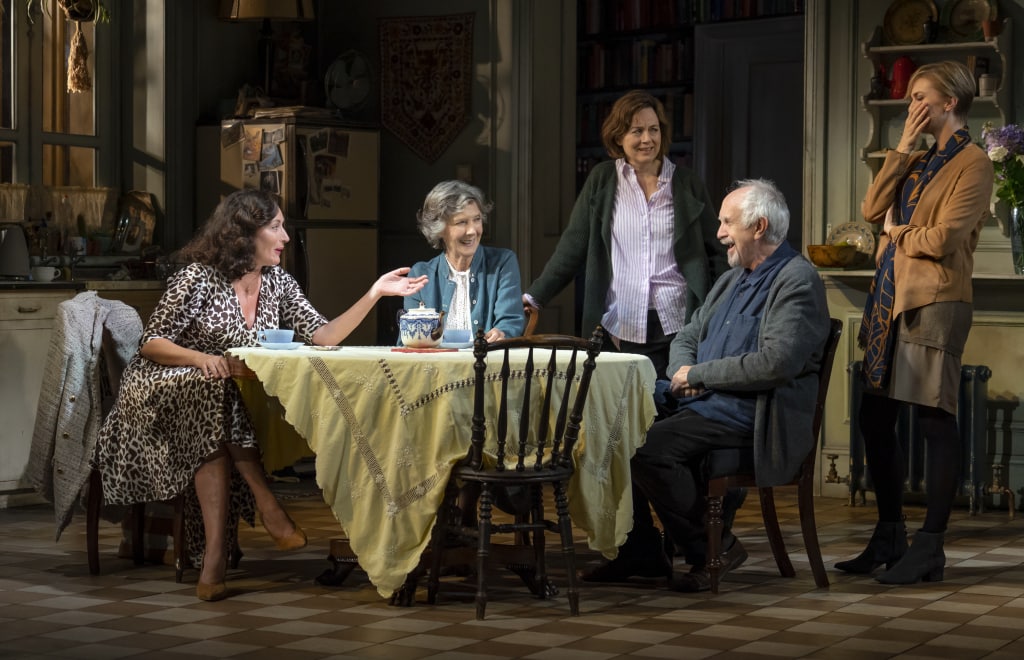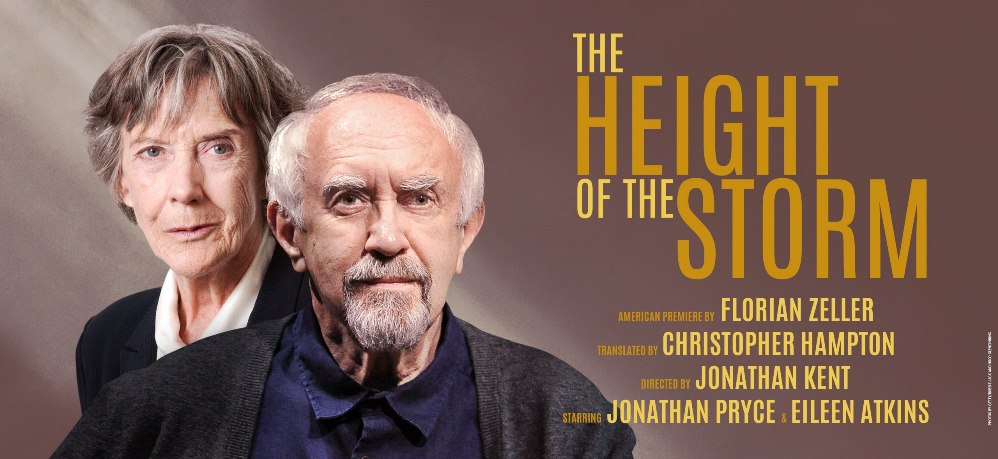“For better or worse” is a promise couples make when taking their wedding vows, but few comprehend how bad the worst can be when old age, dementia, and death bring shattering change to a longtime marriage. Florian Zeller’s The Height of the Storm, translated from the playwright’s original French by Christopher Hampton and directed by Jonathan Kent, examines the state of utter confusion, devastation, and familial dysfunction from the muddled perspective of an elderly spouse, in the Manhattan Theatre Club’s affecting Broadway presentation of the acclaimed London production at the Samuel J. Friedman Theatre.

Award-winning British actors Jonathan Pryce and Eileen Atkins headline the American premiere, bringing their unsurpasssed talents from the West End to New York and fully embodying the personalities, relationship, and condition of their characters André and Madeleine, married for 50 years, while personifying the titular metaphor of a disastrous storm that has struck their home, in the countryside not far from Paris, with the damaging forces of nature. The central conceit is visualized in a haunting monochrome image on the downstage scrim, which rises and falls between each scene, and brilliantly evokes both the branches and trunk of a tree struck by lightning and an x-ray of human neurons.
Through conversations and interactions between them and among others who’ve come to the house, we get fragmentary glimpses of their history together and enigmatic hints at their present state. She is organized, efficient, clear, and forthright – the backbone of the family who keeps the household running smoothly, provides the support everyone needs, and offers sobering reality checks, with an occasional cynical quip and speechless double-take that add welcome touches of humor to their story. He is a study in the crippling effects of Alzheimer’s and the unexpected but inevitable separation from loved ones, with a decreasing ability to comprehend, and refusal to accept, his deteriorating situation. He stares out the window in silence then rages against the changes in his life, envisions hazy memories but forgets who the people with him are, absentmindedly repeats himself and looks completely dazed, and runs the emotional and psychological gamut of laughing, crying, and actively responding to the figments of his imagination, in a profoundly impactful characterization of the anguish of aging and the fragility of life.

A fine featured cast contributes well in defining the heartrending dilemmas and decisions, stress and sorrow, and resultant conflicts that are faced not only by elderly parents, but by their adult children. Amanda Drew and Lisa O’Hare deliver distinctive portrayals of the couple’s daughters Anne and Élise – the former seriously grappling with the heartfelt hardships of devoted love and caregiving and the guilt-ridden choices she must make, trying her best but breaking down in tears, overwhelmed by what has happened and what seems unavoidable; the latter largely absent from regular visits or committed support, seeming more upbeat, self-absorbed, and focused on her latest lover than on the familial crises that require her help and attention. Rounding out the excellent performances are James Hillier as The Man and Lucy Cohu as The Woman, mysterious visitors whose identities shift in the forgetful and deteriorating mind of the senile André, and add more layers of complexity in the family’s story.
A meaningful design effectively supports the theme, with an interior set and costumes by Anthony Ward that are relatable and familiar, dramatic lighting by Hugh Vanstone that appropriately places the characters in moments of darkness or illumination, and sound by Paul Groothuis and original music by Gary Yershon that underscore the consummately human feelings and moods.
The play’s narrative is challenging, with non-linear episodes, a lack of clarity about what’s going on, and difficulty in discerning what’s real or imagined, if it’s today or another day, what’s happening now and what happened then. It can be frustrating and bewildering at times, and that’s precisely the point. If you find it disconcerting and hard to follow, you might begin to comprehend the ravages of time, loss, and dementia, and to empathize with the plight of those who are suffering. The Height of the Storm is the height of theater; it’s art that can make a difference, by making us more compassionate.
Running Time: Approximately 75 minutes, without intermission.





